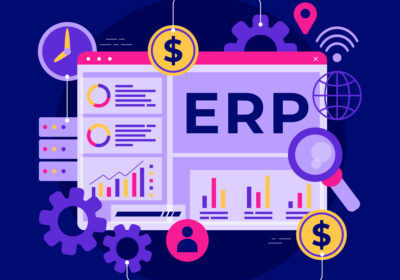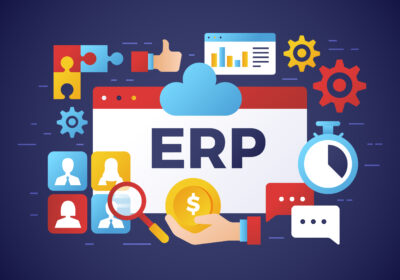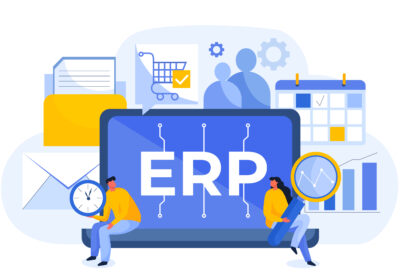In today’s dynamic and competitive business landscape, streamlining operations, optimizing resource allocation, and gaining a holistic view of your organization are essential for success. Enter Enterprise Resource Planning (ERP) software – a robust and comprehensive suite of tools designed to integrate and automate core business processes. ERP software transcends the limitations of siloed departmental applications, fostering collaboration, boosting efficiency, and empowering businesses to make data-driven decisions for sustainable growth. This blog delves into the transformative potential of ERP software, exploring how it can revolutionize various aspects of your organization.
-
Streamlined Operations and Enhanced Efficiency:
One of the most significant advantages of ERP software lies in its ability to streamline core business processes across departments. Imagine a scenario where your finance, inventory, and sales teams operate with independent software systems. ERP software bridges these gaps, creating a central repository of data that eliminates redundancy and facilitates seamless information flow. Streamlined processes like order fulfillment, production planning, and customer service interactions become more efficient, reducing operational costs and improving overall productivity.
For instance, an ERP system can automatically generate purchase orders when inventory levels reach predefined thresholds, ensuring timely restocking and preventing stockouts. Similarly, the system can integrate with customer relationship management (CRM) software, enabling sales representatives to access real-time inventory data and provide accurate delivery estimates to customers. This integrated approach minimizes delays, fosters transparency, and enhances customer satisfaction.
-
Improved Financial Management and Visibility:
Financial management is the backbone of any successful business. ERP software centralizes financial data, encompassing accounts payable and receivable, general ledger, and financial reporting functionalities. This consolidation provides real-time insights into cash flow, profitability, and overall financial health. Financial reports can be generated effortlessly, allowing for informed decision-making regarding budgeting, resource allocation, and investment opportunities.
Furthermore, ERP software automates repetitive tasks such as accounts payable processing and invoicing, minimizing manual errors and streamlining financial workflows. Real-time financial data empowers businesses to identify areas for cost reduction, optimize pricing strategies, and make informed decisions that contribute to long-term financial stability.
-
Enhanced Inventory Management and Control:
Inventory management plays a crucial role in ensuring customer satisfaction and optimizing operational costs. ERP software provides a centralized platform for managing inventory levels, tracking stock movement, and forecasting future demand. This real-time visibility empowers businesses to maintain optimal inventory levels, avoiding stockouts that can lead to lost sales and customer dissatisfaction.
Imagine a manufacturing company struggling with manual inventory management, leading to inaccurate stock levels and production delays. An ERP system can track raw materials, work-in-progress, and finished goods, providing insights into production bottlenecks and enabling proactive inventory replenishment. This not only minimizes the risk of stockouts but also reduces the need for excess inventory storage, freeing up valuable working capital.
-
Strengthened Supply Chain Management and Collaboration:
Supply chain disruptions can significantly hamper business operations and customer satisfaction. ERP software fosters collaboration across the supply chain by providing a central platform for communication and data exchange. Suppliers can access real-time demand forecasts and update delivery schedules, enabling businesses to proactively manage inventory levels and mitigate potential disruptions.
Furthermore, ERP systems can automate purchase orders, track shipments, and streamline communication with logistics providers. This improved visibility and collaboration across the supply chain contribute to more efficient deliveries, reduced lead times, and ultimately, enhanced customer satisfaction.
-
Data-Driven Decision Making and Improved Performance:
ERP software acts as a central repository for all your business data, encompassing financial records, inventory levels, sales figures, and customer interactions. This wealth of data empowers businesses to leverage powerful analytics tools to gain valuable insights into operational performance, customer behavior, and market trends. Data-driven decision-making becomes a reality, enabling businesses to identify growth opportunities, optimize resource allocation, and develop targeted marketing campaigns.
For instance, an ERP system can analyze sales data to identify your most profitable product lines or customer segments. This information can be used to optimize production planning, marketing strategies, and resource allocation, ultimately propelling your business towards sustainable growth.
-
Enhanced Customer Relationship Management (CRM):
ERP software can integrate seamlessly with CRM solutions, providing a unified platform for managing customer interactions. Sales representatives gain access to real-time customer data, including purchase history, past interactions, and preferences. This personalized approach fosters stronger customer relationships and improves the overall customer experience.
Furthermore, ERP data can be used to identify customer needs and preferences more effectively. Targeted marketing campaigns can be created based on customer segmentation, leading to higher conversion rates and increased customer loyalty. The integration of ERP and CRM software empowers businesses to build stronger customer relationships, drive sales growth, and foster long-term customer satisfaction.
-
Improved Scalability and Adaptability to Changing Market Demands:
As businesses evolve and market demands shift, the ability to adapt and scale operations becomes crucial. ERP software provides a scalable solution that can grow alongside your business. Modular designs allow businesses to implement core functionalities initially and gradually add additional modules as needed. This flexibility empowers businesses to cater to changing market dynamics, expand into new territories, and adapt to evolving customer needs.
For instance, a startup company might begin with a basic ERP system focusing on inventory management and sales processing. As the business grows, additional modules for human resource management, project management, or e-commerce functionalities can be seamlessly integrated into the existing system. This eliminates the need for rip-and-replace strategies, minimizing disruption and ensuring uninterrupted business operations during periods of growth.
-
Heightened Security and Data Integrity:
Data security is paramount in today’s digital age. ERP software vendors prioritize robust security measures to safeguard sensitive business data. Features like user access controls, data encryption, and audit trails ensure that only authorized personnel can access critical information and that all data modifications are tracked and documented. This comprehensive security approach minimizes the risk of data breaches and protects your business from financial losses and reputational damage.
Furthermore, ERP systems promote data integrity by maintaining a single source of truth for all business information. Eliminating duplicate data entries and siloed data storage minimizes inconsistencies and ensures that everyone across the organization is working with the same accurate and up-to-date information. This fosters collaboration, improves decision-making, and minimizes the risk of errors caused by outdated or inaccurate data.
-
Improved Regulatory Compliance:
Businesses are subject to a complex web of regulations, and ensuring compliance can be a daunting task. ERP software can streamline compliance efforts by automating tasks such as tax calculations, reporting, and audit trails. The system can be configured to generate reports that adhere to specific regulatory requirements, saving businesses time and resources involved in manual compliance processes.
Furthermore, ERP software can be customized to reflect industry-specific regulations. This ensures that businesses operating in highly regulated sectors can adhere to compliance requirements more effectively, minimizing the risk of fines and penalties.
-
A Platform for Continuous Improvement and Innovation:
ERP software is not a static solution; it serves as a platform for continuous improvement and innovation. Modern ERP systems offer robust reporting and analytics functionalities that empower businesses to identify areas for improvement across various departments. Data-driven insights can be used to optimize processes, refine marketing strategies, and develop innovative products and services that cater to evolving customer needs.
Furthermore, the modular design of ERP systems allows for integration with emerging technologies like artificial intelligence (AI) and machine learning (ML). This integration unlocks opportunities for automation, predictive analytics, and personalized customer experiences, propelling businesses towards a future of enhanced efficiency and operational excellence.
Conclusion: Unlocking the Transformative Potential of ERP Software
In conclusion, ERP software is not merely a software solution; it’s a strategic investment that can transform your business operations. By streamlining processes, enhancing data visibility, and fostering collaboration, ERP software empowers businesses to achieve operational excellence, make data-driven decisions, and navigate the ever-changing business landscape with agility. As you embark on your ERP selection journey, consider your specific business needs, long-term goals, and scalability requirements. With a well-defined implementation strategy and a commitment to ongoing user training, ERP software can unlock the transformative potential within your organization, propelling you towards a future of sustainable growth and success.





